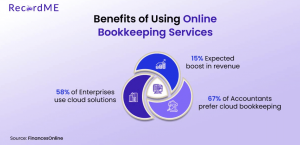Business leaders and entrepreneurs are navigating through 2023 with optimism for artificial intelligence. Technology is transforming each industry, not even leaving bookkeeping services behind. Accounting stands to gain the most from technology due to the mountain of manual tasks that automation can replace. The global market for online accounting software stood at $11.9 billion in 2020. Research indicates it will continue to grow at a Compound Annual Growth Rate (CAGR) of 19.6%, reaching $70.2 billion by 2030. Yet, despite the recent breakthroughs in AI technology, digital bookkeeping still faces certain challenges in the market. To reach the projected growth, accounting solutions must address difficulties, such as data security concerns and lack of training.
Data Security Concerns
Companies that leverage technology can better meet the market’s shifting demands. In the post-Covid world, this thumb rule appears especially true due to the neck-breaking technological advancements. Yet, this digital revolution brings cybersecurity threats as well. In the last quarter of 2022, digital attacks were up 28% compared to the same period in 2021. Due to these threats, consumer-facing businesses demand better data storage and security. Since the unique selling point of online bookkeeping services revolves around cloud data, it poses a challenge for them to maintain data integrity. Cybercrime is going to be a prevalent problem in 2023 as well, therefore, businesses must safeguard their interests going forward.
Limited Customization Options
Online bookkeeping services offer a convenient solution to financial management, but the limited customization options can pose a significant challenge for businesses. The one-size-fits-all approach may not fit the unique needs of every business, especially those with complex financial structures or specific reporting requirements. For example, a business with multiple subsidiaries or international operations may require specialized reporting that a standard software program cannot accommodate.
This lack of customization can result in errors, inefficiencies, and inconsistency in financial management processes. It can also lead to a communication breakdown between finance and other company departments. To overcome this issue, businesses require customized software solutions that offer more flexibility.
Integration with Legacy Systems
It can be a major challenge for businesses to integrate legacy systems with online bookkeeping services. This is especially true for companies that have been operating for a long time and have accumulated significant financial data. Integrating legacy systems with new software can be time-consuming and costly, often requiring substantial changes to existing processes. Sometimes, the integration process may result in data loss or require significant manual input, leading to errors and delays. These challenges can discourage businesses from adopting new software solutions, even if they offer considerable efficiency and cost savings benefits.
As such, software providers must develop integration solutions that are user-friendly, efficient, and cost-effective to encourage businesses to adopt new systems and processes. The most viable option for a business is a financial bot that seamlessly integrates financial software with modern AI technologies.

Reporting Accuracy
In the US alone, the Internal Revenue Service (IRS) fined $7 billion in penalties for incorrect data handling. According to a Bloomberg study, 27% of mistakes in accounting result from incorrect data entry. Given these precedents, traditional companies hold out on digital bookkeeping services, fearing even more inaccuracy. However, online accounting services now utilize advanced AI algorithms to detect anomalies and duplication in data. Even if a company integrates multiple data sources, the tools can efficiently synthesize the data to create a uniform report.
Suggested Reading: Avoid Financial Reporting Mistakes with Digital Bookkeeping
Lack of Training and Support
The lack of training and support can be a significant challenge for businesses adopting an accounting automation system. Although these programs are designed to be user-friendly, a learning curve is still associated with using new software. Companies need adequate training and support to ensure employees can effectively use the tools to handle their finances. A survey indicates that technology literacy is one of the top skills accountants need today. Without proper training, employees may struggle to use digital bookkeeping correctly, leading to errors in financial reporting or incorrect entries. Additionally, without adequate support, businesses may struggle to resolve technical issues or troubleshoot problems that arise.
Even in this digital scenario, only a handful of companies provide a financial bot for digital bookkeeping. These bots are responsible for synthesizing and analyzing data from multiple sources. Thereby reducing the learning curve and the time needed for online bookkeeping services to be operational.
Grow Your Business with RecordMe
RecordMe leverages the power of AI to automate accounting systems by integrating with in-demand accounting software. Moreover, AI ensures the highest accuracy and provides smart validations to address data integrity concerns. Unlike typical solutions, we provide an intuitive financial bot that encourages your team to adopt technology in their operations. Since it functions on the latest cloud technology, you can expect advanced financial insights while also saving huge costs. RecordMe is not just a bookkeeping bot but your partner in economic growth.







